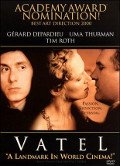
Directed by
Roland Joffe
103 minutes
Rated M
Reviewed by
Bernard Hemingway

Vatel
Vatel is one of those films that make you wonder “what were they thinking”? Whilst on the one hand a small fortune has been lavished on the production side of things, a lacklustre script (by Tom Stoppard adapting the French original by Jeanne Labrune, uninspired music (by Ennio Morricone), combined with the mis-judged casting and clunky editing results in a film that flatlines its way from opening to closing credits with more wardrobe and set design brouhaha and less dramatic conviction than you are likely to see in one place in a long time.
It's 1671 and with war brewing with Holland, penniless Prince de Condé (Julian Glover) invites Louis XIV (Julian Sands) to his chateau for three days of festivities in the hope of winning a commission as his No.1 general. In charge of the pandering is master steward François Vatel (Gérard Depardieu) whose responsibility it is to ensure that the King is pleased despite the obstacles thrown in his path by the King’s predatory gay brother (Murray Lachlan Young), the King’s secretary (Timothy Roth) and his growing attachment to one of the King’s mistresses Anne de Montausier (Uma Thurman).
Joffé is a director experienced with large scale projects as his 1986 film The Mission amply demonstrated (a success that he has never matched since) but why he was chosen to direct when the French themselves do this period so well and why it was shot in English is a mystery. The casting is atrocious with Depardieu speaking clumsy English, Tim Roth incongruous in a perruke and character actors Richard Griffiths and Timothy Spall over-acting in every scene they are in. And as for the supposed grand passion between François and Anne, well just forget it.
Joffé expends most of his energy on reiterative displays of the French court's air-headed foppery and ostentatious decadence rather than in developing his characters who only start to emerge in any meaningful way in the second hour of the film and by then it is all too sudden to have any credibility. For all the money thrown at the screen, when compared to the films of Peter Greenaway for instance, particularly the chronologically-related The Draughtsman's Contract (1982) there is a decided lack of style or elegance on display. All up, it is hard to find anything good to say about the film except for the fact that clearly a lot of people have gone to a lot of trouble to make it work. The result is not so much bad as underwhelmingly ineffectual.
Want something different?





